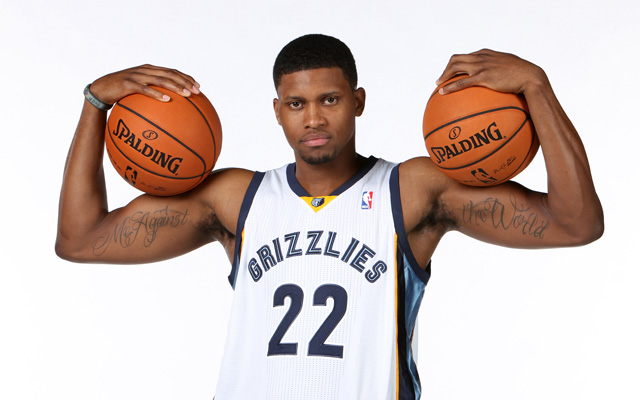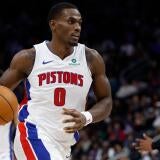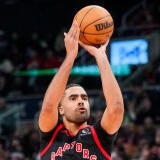Grade the Trade: Raptors land their franchise cornerstone in Rudy Gay
Grading the results of the trade of Rudy Gay to Toronto, Ed Davis, Tayshaun Prince, and Austin Daye to Memphis, and Jose Calderon to Detroit.
 |
Rudy Gay could never carry the expectations for him on his shoulders. (Getty Images) |
You can read Ken Berger's trade analysis here.
For more on this trade and all your daily NBA news, check out Eye on Basketball on Twitter. You can follow Matt Moore @MattMooreCBS.
With the Memphis Grizzlies trading Rudy Gay to Toronto, which sends Jose Calderon to Detroit and Ed Davis to Memphis as the Pistons send Tayshaun Prince and Austin Daye to Memphis, we examine the results for all three teams and grade it out.
Toronto Raptors: C+
Let's pretend we live in a world without money. Where goods and services are just provided for everyone and players are paid in, I don't know, video game points or something. The Raptors just landed the player who will be the best player on their team. Anytime you land the best player in the deal, and gain the best player on your team (given Kyle Lowry's struggles this season), it should be a win, right?
But we don't live in that magical world. Santa Claus is not real, and Rudy Gay makes a mind-blowing amount of money. He's an isolation-heavy wing who isn't a magnificent shooter and hasn't developed a post game. Gay is arguably now the best defender on the Raptors, but given they're the 25th-ranked team in defensive efficiency, we're not saying much. If you want to understand the economic impact of this team, here's one for you.
Rudy Gay plus Landry Fields plus Linas Kleiza plus Terrence Ross equals $96.39 million dollars over the next five years. That's just a huge amount of money for a team like Toronto, which needs to overspend to pull in free agents.
It's mostly that the Raptors spent their best trade chip to get Rudy Gay, which is kind of like breaking open your piggy bank you've been saving for three years to buy the mid-size luxury car.
I like the boldness of making the move, I like the player and his fit with coach Dwane Casey. I like not getting stuck and having to waste Calderon's trade potential. But you just can't look at this move as anything but sideways, unless Gay is able to blow up and live up to his contract. If that happens...
Memphis Grizzlies : A-
There's this perception that what Memphis did was break up a championship contender. Let's be clear. Gay was not what was standing in Memphis' way of a championship. He was a huge part of their success over the past four years. But he was just that, a part, and not nearly a part worth the money that was paid. Year after year, Memphis would hope that this would be the year that Gay would explode, put it all together, push his game further. But it just never came.
And in the meantime, fans turned on him. The 2011 playoff run was the best thing that has ever happened to the franchise, and it is also the worst thing that could have happened to Gay with the fans. No one remembers the lack of a wing creator and defender vs. Oklahoma City, whose presence might have enabled the Grizzlies to shock the world twice in one playoffs. All they remember is that the farthest a Memphis team has ever gone was with Rudy Gay on the shelf. That's not fair to Gay as a player, a teammate, but it's how the perception developed.
This will be overlooked by national voices, and should not. There will be sad fans in Memphis with Gay gone, but there will also be a resolute belief the team is better, just without Gay. That's not necessarily true. We'll have to see how the new pieces work, and it's very much no fault of Gay's. It's just perception.
And had the Grizzlies simply money-dumped him, that might have been the case. Losing Gay's contract isn't really helpful for Memphis in a meaningful way. The Grizzlies still have huge money tied up in Zach Randolph, Mike Conley, and Marc Gasol. This doesn't free them up for big addition. Had they simply tossed him for cap filler, it would have been a loss.
But instead, Memphis got three pieces back which will have an impact for the team.
Ed Davis is the best value player in the deal. He's emerged for the Raptors this season as a versatile forward who can rebound, defend, and attack the basket in sets. The Grizzlies' bench has been a nightmare for years, and was missing a component when Marreese Speights was traded to Cleveland. Davis provides the fourth big along with Darrell Arthur that they need.
Tayshaun Prince's contract made no sense for Detroit when they signed him to it. They were rebuilding, going young. They didn't need his experience or that money on the books. But the Grizzlies instead get a veteran who fits very much into what they do, can produce on the perimeter off the dribble (a key piece they needed to get in return for Gay; the idea that they could just get back shooters and bigs put their system in limbo), and is an excellent defender.
Austin Daye has been a project for years. He's shown some things this year, and while it's unlikely Lionel Hollins can pull anything out of him, we've been wrong on that before, with Speights, Tony Allen, and others.
In all, the Grizzlies got rid of a player who too often ran isolation, had developed a poor relationship with fans through no fault of his own, and whose contract was a gigantic anchor threatening to drown a new ownership group who just had to pay all the expenses of buying a franchise. In return they landed a value big on a rookie contract, a veteran who can space the floor and play defense, and a project wing with potential.
The only reason this isn't an A-plus is because Memphis' success has been based on its locker room chemistry. The Grizzlies play exceptionally well together. What happens when that feeling is disrupted and new personalities are introduced? That uncertainty is all that keeps this from being an all-out win for Memphis.
Detroit Pistons: B
As I said above, Prince made no sense for this team. Lawrence Frank wanted him because a veteran coach never wants a team with nothing but upside. But Prince was not part of the team's long-term future. He was a relic of the past, the leftover from the 2004 championship team. He'll always be a Piston at heart. But Detroit needed to sever ties just to commit to the future.
Calderon can be a mentor to Brandon Knight, something he hasn't had at the point guard spot. He can space the floor and throw lobs to Andre Drummond. His expiring contract gives them flexibility to add to the core next summer, and signals that Detroit is finally, mercifully, ready to move forward with the young core. This is Greg Monroe's team now.

















